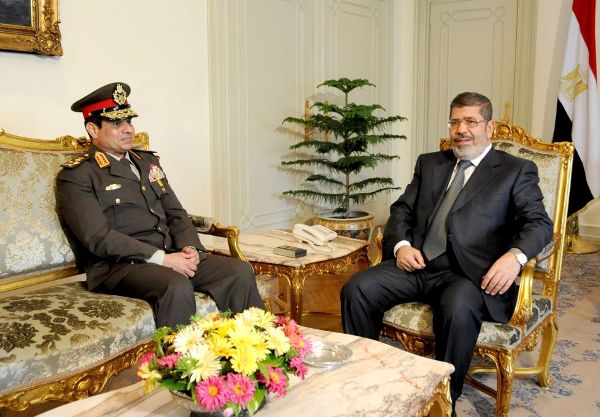
It is to be expected that people differ in their analysis of the reasons for the current state of affairs in Egypt. Some hold the former regime responsible for the situation and perceive it as their heritage, while others see it as a normal consequence of the so-called democratic transition. Additionally, an increasing number of other Egyptians are linking the situation to the failure of President Morsi and his Muslim Brotherhood in administering the country.
For every theory on why the situation in Egypt has deteriorated to the verge of collapse, there are as many theories on how to pull the country back from the edge. Some supporters of the current regime call for the implementation of Shari’a, claiming there is no other alternative. They cling to an oft-repeated phrase, calling on all to respect the legitimate choice of Egyptians. Another sector of society recalls the days of the former regime with a sense of nostalgia, ignoring the many reasons people took the street against Mubarak and his government in January 2011. Whether they are among those who personally benefitted from the previous regime, or are among those who associate Mubarak’s government with stability and security, the fact of the matter is, returning to the previous state in Egypt is impossible.
On the other side of the conservative spectrum, there are those who don’t believe that Morsi is capable of implementing Shari’a .They envision a ‘state of Islam’, obliging women to wear a veil, forcing non-Muslims to pay a tax (jizya) money to live safely, and preventing a ‘corrupt media’ from exposing their scandals.
In addition, there are those who view a future for Egypt as a democratic secular state, where all are treated equally, and their rights and freedoms are guaranteed regardless of religion, background, occupation or anything else. They are, however, unable to find or agree upon a candidate they can support in order to achieve their demands.
In contrary to these perceptions, and as Morsi ‘s government fails to achieve true democracy, respect human rights, restore security or improve economic welfare, an increasing number of people are calling the army to return to the political scene as the only possible alternative to replace Morsi. A recent poll by the Ibn Khaldun Center for Development studies showed that 82% of the respondents supported a return of the army to power. This shift in attitude comes mainly because the previous alternatives do not seem to be capable of replacing Morsi. But why?
For supporters of Mubarak, it is obvious that a return to the former regime is impossible. With a desire to restore a relative stability, one in which protests and unrest are a thing of the past, they have shifted their focus to the army. They believe the army can address the deteriorating economy, prevent protests and preserve security. This stance comes as no surprise, as after Mubarak stepped down, they held similar protests supporting military rule under the Supreme Council of the Armed Forces.
For many of those in favor of a secular democratic state, they realize that liberal and leftist opposition figures lack the required public support to rule Egypt, or the ability to force radical Islamists to comply with secular notions and human rights principles. Accordingly, many of those are now looking to the army as the only way to oust Morsi, limit Islamist influence, and achieve a more secular state until liberal/leftist forces can boost their grassroots efforts. Under these circumstances, we have witnessed those who chanted ‘against SCAF’ now chanting for the army’s return.
Meanwhile, the advocates of the ‘state of Islam’ remain confused on whether to support Morsi, while pushing him in a more radical direction, or to support a more right-leaning candidate, such as Hazem Salah Abu Ismail. The Salafist leader has made his stance on the return of the army very clear, describing it as “not just a red line, but a line of flamed fire, that we all will face with full strength”.
The Muslim Brotherhood has also been accused of making veiled attacks toward the army, in an attempt to circumvent their increasing popularity. The Brotherhood Supreme Guide Mohamed Badie denied these accusations, describing them as an attempt to tarnish the relationship between the Brotherhood and the army. The Brotherhood and army have also been involved in a struggle that has gone largely under the radar, over the control of state land.
The current situation puts Morsi in the midst of a dilemma, which could have serious repercussions on his position. With a renewed sense of support for the army, and his failure to stabilize the country or achieve the demands of its different sectors, Morsi is in an untenable position.
The army’s apparent sense of impatience with the president was seen just last month, issuing statements that were interpreted as a veiled threat to Morsi. The president’s actions indicate that he knows that he needs the army firmly on his side. This can be seen in his decision to perform Friday prayers at the Central Military Zone, together with making every effort to downplay any perceived tensions between the presidency and the military, and emphasize his confidence in the army’s abilities.
Fady Salah is an Egyptian writer, journalist, political analyst, and author.
Photo: Egypt Presidency
Image: Morsi%20Abdel%20Fattah%20Sisi.jpg
